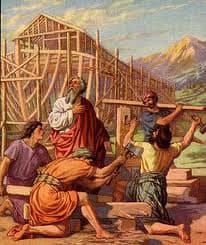 On the verse “Noah ( Noach) was a righteous man, perfect in his generations (Genesis 6:9), our sages disagree regarding its intent. Rashi says, “Among our sages, there are those who interpret this as being in praise of Noah: If he was righteous in his generation then certainly he would have been even more righteous if he would have been in a generation of righteous people. And there are those who interpret this as a condemnation: In relation to his generation he was righteous, but had he been in Abraham’s generation, he wouldn’t have been regarded as anything
On the verse “Noah ( Noach) was a righteous man, perfect in his generations (Genesis 6:9), our sages disagree regarding its intent. Rashi says, “Among our sages, there are those who interpret this as being in praise of Noah: If he was righteous in his generation then certainly he would have been even more righteous if he would have been in a generation of righteous people. And there are those who interpret this as a condemnation: In relation to his generation he was righteous, but had he been in Abraham’s generation, he wouldn’t have been regarded as anything
What then is the intrinsic difference between Noah and Abraham? Noah is described as “walking with G-d”( Genesis 6:9).
Rav Kook describes this ‘walking” as a “striving to behave the best that one could within the context of the norms of their generation”. That is to say, to act righteously in spite of the corruption of the generation and their depraved norms and accepted behaviors. This is what Noah excelled in. He was obedient to G-d and began the task of building the ark which continued for 120 years.
The Midrash Tanchuma explains: why did G-d make Noah toil to build the ark? In order that the people of his generation should see him occupied with the task for 120 years, and they should ask him, “Why are you doing this?” His answer might move them to repent.”
Abraham, however, “walked before G-d”( Genesis 17:1) . Rav Kook explains that this is the action of one who strives for higher ground and for a moral perfection that transcends the norms of the age into which they were born. That is , it is to walk into the unknown with the sure faith that G-d is standing behind him.
Every one of Abraham’s actions reflected a determined faithful progress into an ever deepening relationship with G-d.
Yet there was one more important difference. We never read of Noah speaking to G-d. Noah was still imprisoned in the perception that G-d was the “All High G-d” that one needs to be obedient to . Yet one could not be involved in a relationship with this same All High G-d. Noah was clearly ignorant of the possibility of discussing and even arguing with G-d for the sake of his fellow men.
The Zohar comments on the verse “The end of all flesh is come before Me,” ( Genesis 6:13) and describes how Noah did not pray for mercy for the world, as Abraham would in the future at Sodom. This is why the Flood is called “the waters of Noah” (Isaiah 54:9) He is held accountable and responsible for the flood because he did not appeal for mercy on the world’s behalf.”
Noah seemed to be unaware of the power of prayer.
Such was not the case with Abraham, who prayed, requested, discussed and even argued with the G-d . Abraham introduced relationship with G-d and prayer to him into the world.
It is not coincidental that we are reading these three Torah portions as we leave the intense and glorious days of Rosh Hashanah , Yom Kippur and Sukkoth and enter into the seemingly bitter month of Heshvan. It is a cold season that we are now entering. Prayer and relationship with Hashem is all that we are left with to protect us.
We ended the festival of Sukkoth with the Aravot ( willow branches). During the days of the Holy Temple, these willow branches were brought from the village of Motza and were placed around the altar throughout the feast . On the last day of Sukkot, after putting away the lulav and etrog we remain holding five branches of the willow branches in our hands. At the end of the service they are flung on top of the Ark of the Scrolls, a place of honor. These willow branches clearly carry deep meaning.
One of the deepest of thoughts regarding these Aravot ( willow ) branches is presented by the Sfat Emet. The four species we brought together on Sukkot are laced with meaning and symbolism. Some have a taste and a fragrance, taste being symbolic of torah knowledge and smell is the sweet fragrance of mitzvoth. Some have only one of those attributes and the willow has neither. Furthermore the etrog ( citron fruit) represents the heart, the lulav ( the palm branch) the spine, the hadas ( myrtle branch) leaves, the eyes and the willow leaves represent the mouth
The Sfat Emet teaches that after the festivals are over we may all be like the willow branch with no palpable attributes .
All that we have is the power of our mouths, which is the power of prayer. That is what gives us the power to move forward. That is what was missed by Noah in spite of his righteousness. Yet it will be reintroduced into the world by Abraham .
The ability to pray and converse with Hashem remains to this day our greatest source of strength and comfort..